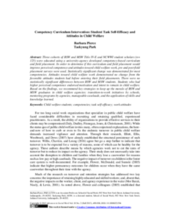Abstract: Three cohorts of BSW and MSW Title IV-E and NCWWI student scholars (n= 125) were educated using a university-agency developed competency-based curriculum and field placement. In order to determine if this curriculum and field placement would improve perceived competence and attitudes toward child welfare work, pre and post-field placement surveys were used. Statistically significant change was demonstrated for most competencies. Attitudes toward child welfare work demonstrated no change from the favorable attitudes students had before entering their field placements. There were no statistically significant differences between BSW and MSW students. Students who had higher perceived competence endorsed motivation and intent to remain in child welfare. Based on the findings, we recommend key strategies to keep up the morale of BSW and MSW graduates in child welfare agencies: transition-to-work initiatives by schools, mentoring programs by agencies, manageable caseloads, and the application of skills and knowledge learned.

